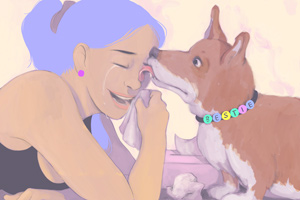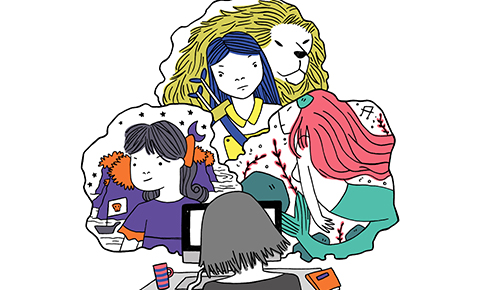Vuoi leggerlo in italiano? Clicca qui.
James Potter, Harry’s father, used to be a bully. We know that, JK Rowling knows that, but that didn’t stop James from growing into a worthy adult, one who deserved his friends’ affection, his lover’s love, and his child’s admiration. And it may be okay. Let’s move on to an interview in which Rowling discusses the future of her characters. The interviewer asks whether Draco Malfoy gets married in the end and, what’s more, if he marries Pansy Parkinson… and JK Rowling laughs, aghast: – I loathe Pansy Parkinson! – she says. – She’s a bully! – she says. – She’s everything I hate – she says. And I agree with her. Point is, there’s a huge problem in giving the very same flaws to a girl and a boy, and then dealing with them this differently. To get things straight: I’d rather throw both James Potter and Pansy Parkinson off a cliff, but it’s the double standards in the way they’re treated that baffles me.
If this happens in a series like Harry Potter, that nevertheless blessed us with female characters as complex and lovable as Hermione, Ginny, and Luna, looking at other pieces of literature, things get sensibly worse: female characters tend to be secondary or one-dimensional, or if they dare to be less than perfect they get thrown off the aforementioned metaphorical cliff.
This way, Susan Pevensie gets to be Queen of Narnia, but one fine day she’s forbidden to go back to her realm because now she likes things like lipsticks. Eowyn is an extraordinary character, but she gets maybe thirty pages out of the one-thousand-something of The Lord of the Rings. Andersen’s Little Mermaid gives up her voice to find her prince, doesn’t get him, dies in the end. Little Red Riding Hood gets eaten by a wolf and thank god there’re sensible hunters in the neighborhood. And so on.
If you’re upset at this mess as much as I am, you’ll be glad to be introduced to Emily Lomax, a young californian engineer by day, writer with thousands of readers by night. She writes her own original fiction too, but the reason why I’m introducing her to you is the following: she walks into the shoes of the female characters we’ve read, and writes a story from their point of view. She does so with an incredible amount of respect towards canon, but in such an empathic and visionary way it makes these women turn into – or go back to being – astonishingly real people. Most of her fanfiction lives in Archive of Our Own, where you can find her series of eight stories about the ladies of Hogwarts, but also her Eowyn, Arwen, Susan, Wendy, and so on so forth. Her own novels can be found, bought, or downloaded for free on her website. And now to the chat she was so kind to have with me. Enjoy your reading!
First things first: please tell us about you!
On tumblr I’m ink-splotch, and on most other sites I’m dirgewithoutmusic because that’s the title of one of my favorite poems. I write my novels under E. Jade Lomax because at twelve I decided that my name, which got written on letters and homework assignments as Emily Lomax, would look weird on book covers–also, I adored my middle name. I’m a seventh generation Californian on my mother’s mother’s side. I’m 23, with a BS in Mechanical Engineering and a BA in History. I work at a company that builds surgical robots. I write stories at night and it’s hard to imagine being more satisfied with my life.
I first found you on the web thanks to your Wendy Darling, and I know a lot of people did thanks to your Susan Pevensie. How did you happen to start writing your… character studies, if it’s okay to call them that?
The first character study I wrote was about Susan Pevensie and how she might have lived, loved, and grieved after she lost Narnia and then her family, too. The internet exploded back at me (some with praise, some tears, some rageful disagreement) and I was flabbergasted. This had been meant as a bedtime story for myself. I had been struck, suddenly, by the sadness of Susan and I had wanted to build her a story where she learned how to live with and love herself in the aftermath. I hadn’t expected anyone to read it, but they had.
So, I shyly tried to wrap my mind around Wendy Darling, and write about what it might be like to come back from Neverland, flightless, grounded, with new things to learn; about Little Red Riding Hood and how she lived after the wolf; about a little mermaid who never loved her prince and so slipped out of both her curse and her cure, and fell in love with the world instead.
These were stories I liked telling–about girls, about the life after the extraordinary, about picking up the pieces–but I hadn’t realized that anyone else would want to read them.
I know that tumblr people are as enthusiastic about your pieces as I am. When did you start putting them on the internet, and what was the first piece you wrote that received that kind of applause? What was your reaction? (I like to imagine you as pleasantly freaked out as much as one can be, but you tell me)
So very pleasantly freaked out. I tried to explain tumblr and notes and reblogs to my parents, to explain why I was so wide-eyed. My best friend went and tracked down all the places people had posted it outside tumblr and sent me the good or the particularly laughable reactions.
Susan is where I started. I saw a beautiful image set by ifallelseperished, got suddenly and rather unexpectedly thoughtful about Susan Pevensie, and scribbled out a “bedtime story” for myself, to make me feel a bit better about her fate. It was a very rewarding use of a half hour.
It’s been over a year since then. I’ve written a lot of things I’m proud of and I’ve learned a lot, from myself, from the women I write about, and from the people I’ve met and interacted with online because of it.
As a reader and a woman, it took me an awful lot of time to realise that the fact that I was inclined not to like any female character in literature EVER might not be a testament to what female characters in literature were bound to be, but to the stereotyped view their (usually male) authors had of women in general. What was your experience with regards to this? Were you immediately aware of the bias female characters were forced to face, or did it take time for you to realise? If the second is true – what was the catalyst?
Well, we all learn things in bits, don’t we? There are certain things that I figured out, literally, while writing that first Susan piece. Defending specifically vanity in women wasn’t something I knew was important to me until I started really thinking about young Miss Pevensie and all the things they said had damned her.
And then there were things I had been raised knowing, because I was and am very lucky to have a family full of women with many different kinds of strength and intelligence, who are very good at talking to and respecting each other.
One of the important things I realized, as I grew older, was that the female characters I loved weren’t as complicated, faceted, and respected on the page as I thought they were.
Valentine Wiggin, from Ender’s Game, is a fascinating and darkly flawed moral conundrum, stuck in an impossible situation and reacting to it with subterfuge, manipulation and delicious selfishness. Rereading those books as an adult, I realized that while I looked at Val’s choices and saw a complicated, unanswered and valuable moral question, the narrative framed her as a saint. With her “womanly intuition,” according to the author, she had a right and responsibility to manipulate the “less wise” men in her vicinity. Yuck! By praising her “inherent” goodness as one of those incomprehensible magic people with lady parts have, the author was failing to respect her autonomy, moral responsibility, and darknesses, all the things I loved about her.
I spent a long time in my childhood “filling in the blanks” around the women I read about. I assumed those gaps were left for me to fill in, because I grew up lucky enough to expect that the women around me and in my fiction were meant to be taken seriously and considered deeply. One of the most valuable things I’ve learned is that, no– very often they need defending. If we don’t do it, who will?
Your Harry Potter series is extremely powerful in my opinion. What strikes me the most is the fact that you were able not only to walk into the shoes of generally lovable characters like Ginny and Luna, but also in the more difficult ones of, say, Cho Chang – or even Pansy Parkinson! It’s an exercise in humanity before being one in literature. How did you approach those more difficult, less likable characters?
Thank you!
Hm. Well, I often don’t have any particular emotions about the characters I write for when I start, which I don’t think people assume about me. I think I come off as a fairly emotional writer, but I’m not. I choose someone, I sit down and I ask myself–who is this person? Why would someone love them? What has happened to them? What has made them? How would they love themselves?
Pansy Parkinson was such a struggle! I don’t like bullies. But I wanted two of every House, because one of the things that series is about is the diversity and worth of each House. Starting Pansy’s piece, I had an extra question to pose to myself– how do I justify writing a “defense” for a bully? I came up with an answer that satisfied me, and that answer runs throughout the piece.
In a lot of ways, these stories are me sitting myself down and deciding to love a stranger. It lights me up. I love getting to live in that kind of headspace, and it’s terrifying and flattering that so many people have responded so positively to that.
Something I genuinely love about your stories is that your awareness to gender issues intersects with a parallel attitude towards race, sexuality, and disability issues. What’s your stance on intersectional feminism, both as a writer and as a person?
The world is vast. People and their personal experiences are myriad, varied, and unimaginable. A feminism that doesn’t take into account that individual women are going to give different things, need different things, and have different struggles is a feminism that is not particularly useful to anyone.
I know you also write original fiction of your own (I’m in the middle of Beanstalk: WHAT have you DONE to Grey?). How does your consciousness of issues of representation influence your writing?
Things aren’t done happening to Grey, yet, don’t worry, love. I’m not sure which of the protagonists will have the most stressful life weighing on their shoulders, but Grey is certainly a contender.
My consciousness of issues is something that is growing, and so its influence on my stories is growing too. If I do this right, it should keep growing all my life.
Another of the most useful things I’ve learnt is that I am writing not in the context of my own work, but in the context of the larger genre. I centered my second novel series around a male protagonist because I thought it would be a challenge for me, and it was, but at that point I didn’t know I also had to take into account where my book might fit into the larger genre of YA adventure fiction. It’s not a consideration that should be the drive for my work and my creativity, but it’s definitely something I plan to keep in mind in my future novels.
Name me three literary or movie female characters who you feel deserved better than what their authors gave them; and three characters who were treated as full rounded people instead.
Gamora and Nebula from Guardians of the Galaxy came so close to being ground-breaking. What little we did get I swallowed whole eagerly, but, gosh, I wanted more.
Any woman Steven Moffat has ever written has stunning potential, no followthrough, and an absurd amount of disrespect from the narrative.
As an adult, I tried to reread the Xanth books, which I’d adored as a child, but the treatment of Chameleon in the first book (that name! in general!) was too disheartening.
Now, for positive examples —
Hermione Granger, specifically in the books, where she’s allowed to have flaws, is going to be one of the defining heroines of our storytelling generation. She’s powerful and well-meant, shrill and sometimes petty, brave and ruthless and unapologetic, loyal and giving and high-and-mighty. She’s complex within herself and allowed to be so many things without ever being diminished or simplified or contradictory. She is a hero and she is also a teenage girl in the grumpy blush of first love and she is also a reader, thinker, friend, and witch.
Tamora Pierce is a star when it comes to writing fully-fleshed female characters with diverse loves, skills, and personalities. One of the other places she excels, perhaps more than any author I’ve read, is in staying openminded and growing. Each book series of hers pushes the boundaries further and further. She doesn’t content herself the first time people praise her for being “forward-minded”– she listens to the people around her and expands and expands her worlds to include stories about all kinds of people. And when she’s wrong, she’s so good about acknowledging it respectfully, apologizing, and growing from it.
Vathara, a fan writer, has an epic work called Embers, which is a reimagining of Avatar the Last Airbender from a sociopolitical context. It deals wonderfully with trauma and fall out, and fire-forged friends, but it also imagines Katara, Toph, Azula, Ty Lee and her various original female characters so complexly that sometimes it’s elevating, sometimes it’s damning, and it is always illuminting. (The original AtlA TV show, also, is a great example of well-written, diverse young women–blind, cantankerous Toph; proud, generous, violent Katara; all the tragedy that is Azula; and now in the new series: brash, learning, growing Korra; brilliant, clever Asami; all of Jinora’s patience and joy.)
I adore Mako Mori from Pacific Rim. Irene Adler and Joan Watson from Elementary are extraordinary. Elizabeth Burke in White Collar is a delight. Hilari Bell is a wonderful writer for women (The Goblin Wood! The Farsala Trilogy!), and I also enjoy Pamela Dean, Megan Whalen Turner, and Diana Wynne Jones.
That’s more than three, but I’m an engineer– I can’t count. 🙂
So far we’ve been talking about characters. It could be argued that female authors have it tough too. Was / is it difficult for you to take yourself seriously as a writer because you happen to be also a woman, or was the intersection between gender and writing harmless for you with regards to this?
I grew up with a stunning advantage in terms of confidence. My parents are some of the most purposefully supportive people I’ve ever met in my life. They have always treated my sister and I like we were sentient and intelligent beings worthy of respect and consideration, and my parents both encouraged and expected us to demand that same level of respect from the authorities and adversaries of our lives.
I also grew up with stunning examples of powerful, unashamed women in my life. One of my grandmothers was a social worker for thirty years. The other came from Oklahoma during the Great Depression and has raised a beautiful, talented extended family out of her red-roofed house. My mother just retired from working at NASA and has been launching communication satellies and sending up biological payloads to the International Space Station for the last few decades.
When people talk about the power of representation in changing what little girls think they can be–this is one of the things they mean. I got to grow up not just knowing but seeing that I could be anything I wanted to be.
To wrap up: a piece of advice to women writers, and writers – male and female – who want to create something different than your average white male cis straight main character!
Don’t make them white! Don’t make them cis, straight, able-bodied, or neurotypical!
If you are white, cis, or male, try reading works done by and about non-white, non-cis, non-male people. I am both white and cis and there are so many things I have no conception or awareness of. One of the things that is so amazing about the internet is our new easy access to so many people and stories who differ from our own. Take advantage.
Writing poorly about marginalized or othered experiences is irresponsible. Excluding them from your stories is also irresponsible. So go, learn. Read authors whose experiences you don’t share and can’t fathom. Listen to the people in your life who know things you don’t or have lived things you haven’t. (Hint: almost everyone you know is going to know things you don’t.) Write about people who don’t look like you, act like you, love like you, or think like you. Learn how to listen. Apologize when you’re wrong. Never think you’re done learning.








Nessun commento